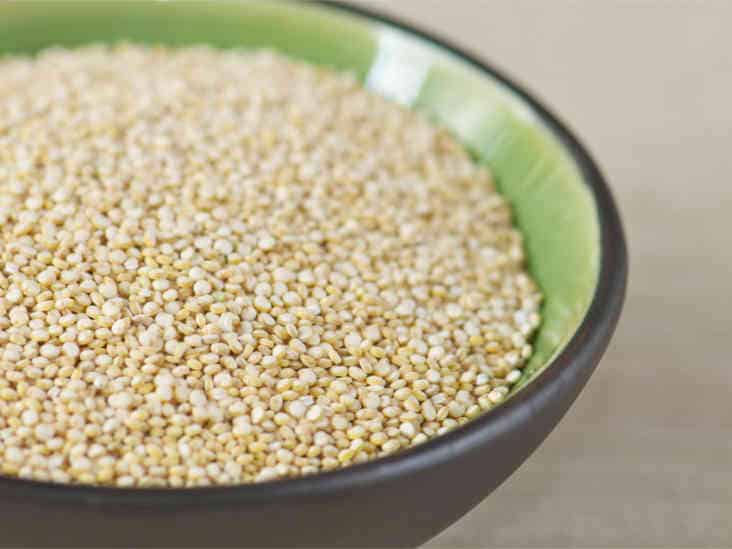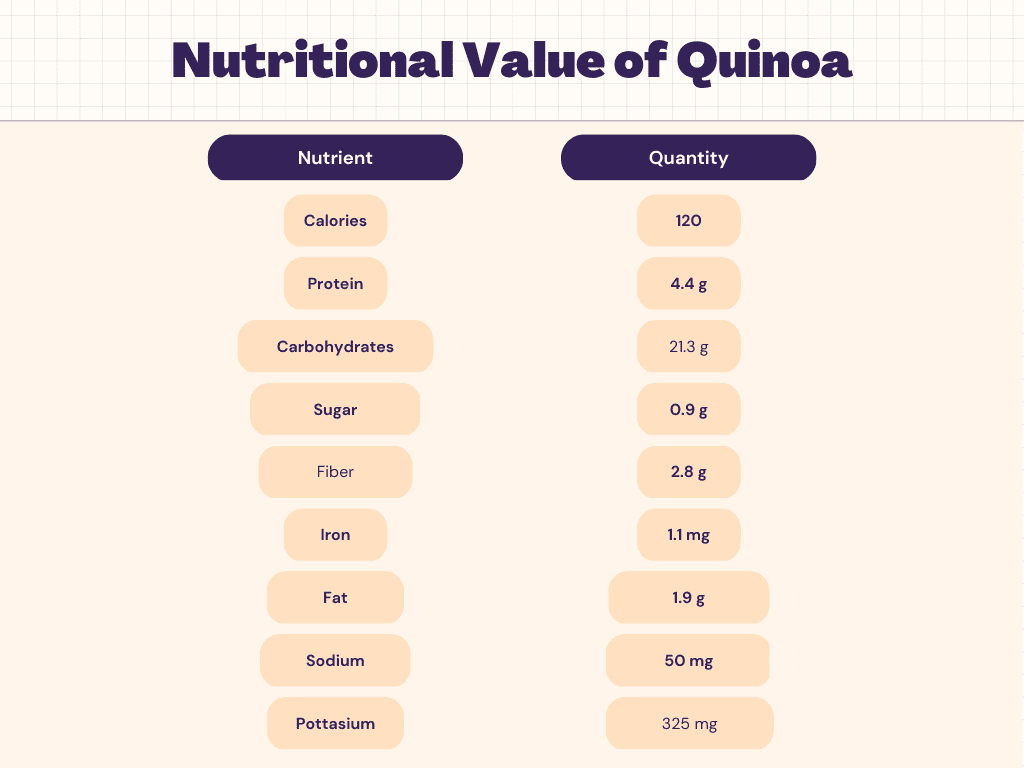Quinoa has a wholesome mix of fatty acids, fiber, protein, vitamins, and minerals. Although it has gained popularity in vegetarian meal plans, you don’t need to adhere to a special diet to serve this grain. Quinoa has advantages that everyone can enjoy.
Nutritional Value of Quinoa
Nutritional Facts of Quinoa
Carbs
39 grams of complex carbohydrates can be a useful source of energy in one cup of cooked quinoa.
Fat
Quinoa contains some fat, however, the majority of it is polyunsaturated and monounsaturated fat, which are both regarded as good fats.
Protein
Unlike many plant-based proteins, quinoa is a complete protein. The nine necessary amino acids are all present in complete proteins.
Calories
The majority of the 222 calories in one cup of cooked quinoa come from its carbohydrate content.
Health Benefits Of Quinoa
- Helps with Diabetes – Fiber is an indigestible component of carbohydrates that aids in satiety, prevents and relieves constipation, and is crucial for maintaining stable blood sugar levels as a result of the intestines’ slower absorption into the bloodstream. Follow our Diabetes Plans.
- Helps lower cholesterol – Both fiber and plant substances known as phytosterols are useful for lowering cholesterol. Quinoa includes a variety of phytosterols.
- Helps in the reduction of inflammation – Due to their antioxidant characteristics, quinoa (and other plants) help heal cells that have been harmed by oxidative stress and decrease inflammation.
- Helps maintain heart health – For the health of your heart, it’s crucial to maintain a healthy weight. Your risk of diabetes and heart disease can be decreased because of the fiber in quinoa’s ability to aid with cholesterol and blood sugar levels.
- Helps with digestive health and weight loss – A fantastic source of fiber is quinoa. Constipation can be avoided or treated with fiber, and it may also reduce your risk of intestinal cancer. It also makes you feel fuller for longer, which could aid in weight loss. Check our Weight Loss Plans here.
Vitamins & Minerals in Quinoa
Magnesium and iron are both abundant in quinoa. Potassium and vitamin E are also present in quinoa. The body uses magnesium in numerous metabolic activities, including some that assist control of blood sugar.
The Bottom Line
In conclusion, Quinoa is a complete protein, which means it has all nine essential amino acids, unlike the majority of plant-based diets. The proteins that make up your muscles, bones, skin, and blood are composed of amino acids. Quinoa contains all nine of the nutrients considered to be “essential,” which must be taken regularly from food as your body cannot make or store them.
FAQs
How much quinoa can I eat in a day?
One to two cups of cooked quinoa can be consumed each day. One should also refrain from eating quinoa if they have stomach pain, itching, or vomiting after doing so.
Should I eat quinoa before or after exercise?
Quinoa risotto Making a nutritious porridge out of quinoa flakes cooked in water or milk gives you the ideal pre- and post-workout balance of carbohydrates and protein.
What are the benefits of Quinoa?
- Helps with digestive health
- Helps with weight loss
- Helps with heart health
- Helps with diabetes
- Helps with lowering cholesterol
What is the best time to eat quinoa?
You can eat quinoa for breakfast, lunch, or dinner at any time. However, it is better to have a healthy meal before bed, like quinoa. It causes sleep because, as a result of its high magnesium and protein content, it relaxes the muscles. “ One to two cups of cooked quinoa can be consumed each day.










